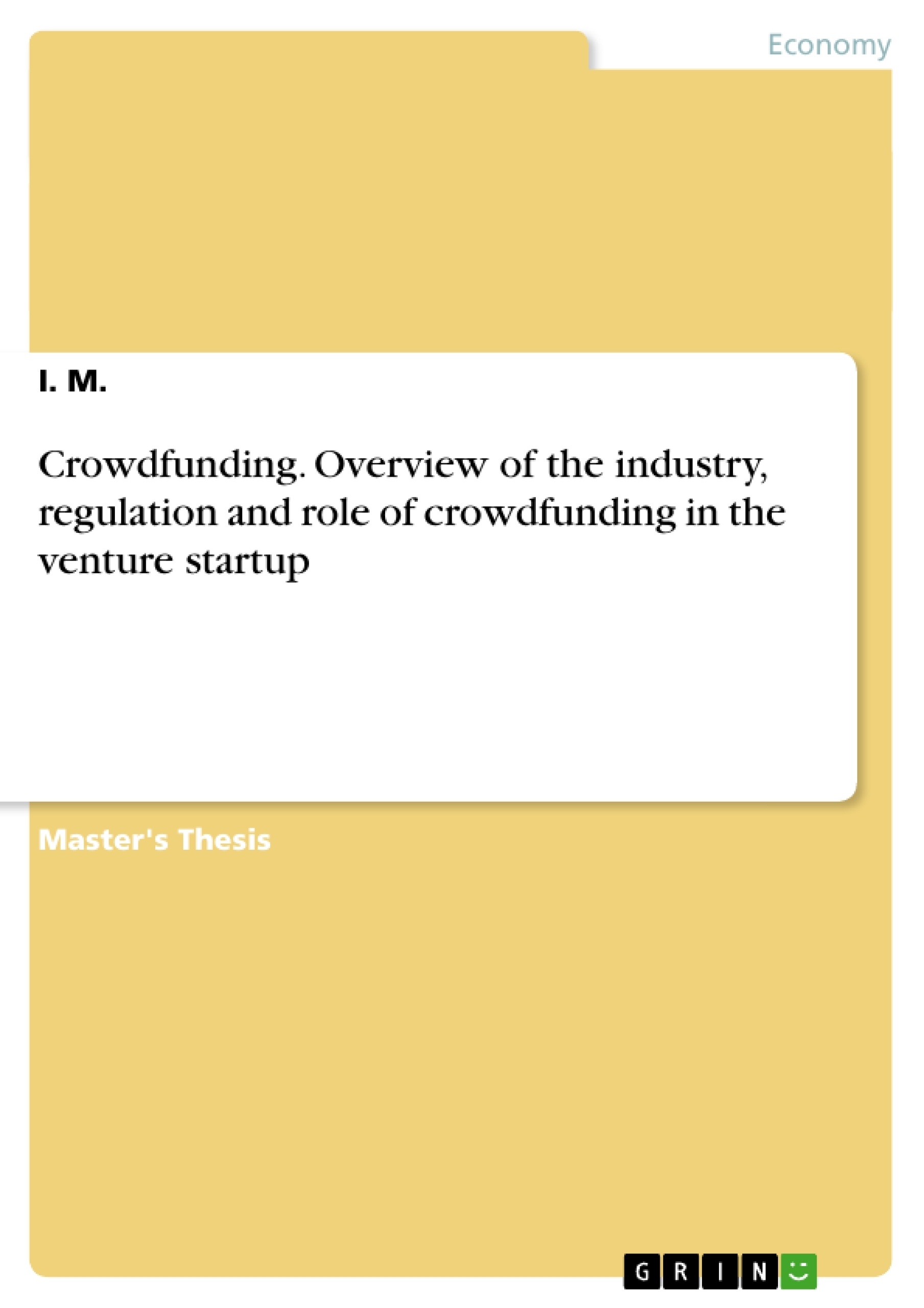Structured Abstract
(Purpose) This thesis aims to take stock and systemize existing knowledge on crowdfunding while providing overview of the industry, its regulatory environment and advancing the insight into the role of crowdfunding in the startup lifecycle.
(Design/metodology/approach) It is adopting an exploratory and phenomenon-based approach which is deemed appropriate when investigating rather new phenomena. Furthermore, the work combines survey and interview methodologies to assess the opinion and real-world behavior of different stakeholders in crowdfunding marketplace and identify gaps requiring further academic consideration.
(Theoretical Perspective) Grounded in limited theories surrounding crowdfunding as well as adjacent fields such as early stage, informal and angel investment.
(Metodology) Empirical data was gathered using multiple interactive web-based questionnaires distributed to different stakeholders and “informed general public” mainly through the social networks (Linkedin, Facebook and Twitter) and direct solicitation of entrepreneurial associations, networks and online communities. The study relies on both qualitative and quantitative analysis in attempt to find data patterns useful in future research and establish some managerial and policymaker recommendations based on limited evidence collected.
(Originality and practical implications) The work adds value to this field through a 3-fold contribution: Taking a look at crowdfunding through the prism of SWOT analysis of the practice itself and Porter’s 5 forces analysis of crowdfunding platforms industry. Providing evidence in favor of implementing various degrees of regulation based on different crowdfunding categories, using the Italian case of equity-based crowdfunding regulation as a model. Finally, it yields some interesting findings on relevance of crowdfunding in the venture startup while pointing out key motivators which make entrepreneurs consider this fundraising option. In addition, related policymaker/managerial implications are exposed and academic literature updated with reference to contemporary developments in this dynamic field.
Keywords: crowdfunding, industry overview, regulation, role, dynamics
Paper type: MSc thesis
Inhaltsverzeichnis (Table of Contents)
- Introduction
- Part I
- What is Crowdfunding?
- Position of Crowdfunding inside the Entrepreneurial Equity "Food" Chain and How Crowdfunding Differs from Angel/VC Funding.
- Main Actors in Crowdfunding Space
- Crowdfunding Taxonomy and Crowdfund Investing Ecosystem
- Literature Review and Principal Research Streams
- General Exploratory Research
- Who Gets Crowdfunded?
- Regulation and Policy
- Dynamics of the Crowdfunding Process
- The Geography of Crowdfunding
- Common Points and Research Gaps
- Five Forces That Shape the Crowdfunding Industry
- Market Overview and SWOT Analysis of Crowdfunding
- Part II
- USA
- Criticism
- Italy
- Is the Italian Approach Truly in Line with Expectations of Market Participants and the General Public?
- Other European Countries and the Future of Pan-European Regulation
- Policymaker Suggestions on Crowdfunding Issues
- Part III
- Theoretical Framework and Grounding
- Research Questions
- Research Method and Design
- Data Collection and Empirical Setting
- Quantitative Findings
- Descriptive Results
- Empirical Patterns and Relationships
- Evidence in Consensus Analysis
- Qualitative Findings
- Qualitative Findings Obtained from Questionnaires
- Expert Interviews
- Business Angels and Equity Crowdfunding (Cases)
Zielsetzung und Themenschwerpunkte (Objectives and Key Themes)
This thesis aims to synthesize and organize existing knowledge on crowdfunding, providing a comprehensive overview of the industry, its regulatory landscape, and advancing insights into the role of crowdfunding in the startup lifecycle. The research utilizes an exploratory and phenomenon-based approach, combining survey and interview methodologies to assess the opinions and real-world behaviors of stakeholders within the crowdfunding marketplace. The study aims to identify gaps requiring further academic consideration, grounded in limited theories surrounding crowdfunding and related fields like early-stage, informal, and angel investment.
- Overview of the Crowdfunding Industry
- Regulatory Framework and Policy Implications
- Role of Crowdfunding in the Startup Lifecycle
- Empirical Analysis of Crowdfunding Practices and Stakeholder Perspectives
- Identification of Research Gaps and Future Research Directions
Zusammenfassung der Kapitel (Chapter Summaries)
The first part of the thesis provides a comprehensive definition of crowdfunding, its position within the entrepreneurial equity “food” chain, and an overview of the key elements of the crowdfunding ecosystem. Different models of crowdfunding are discussed in detail, along with a comprehensive literature review of existing academic work in this field. Intermediaries, such as crowdfunding portals, are briefly analyzed alongside preliminary observations on biases, conflicts of interest, and liability issues. Recent data on the size of the crowdfunding market and its major players are presented, accompanied by a SWOT and Porter analysis of the industry.
The second part explores the risks associated with crowdfunding and examines the current regulatory framework in major economies like the USA, EEA, and Italy. The aim is to critically analyze current legislation and arrive at conclusions that serve as a foundation for policymaker recommendations presented in Part III.
The third part begins with general observations about the VC industry and traditional funding sources, placing crowdfunding within this perspective and arguing how and why crowdfunding can be either complementary or a substitute for more traditional investors. The main research question, whether crowdfunding can serve as a pillar in venture startup, is introduced alongside the description and reasoning behind the methodologies used. Case studies are presented together with the results of a custom-made survey and expert interviews. Findings are then discussed, including policymaker suggestions and managerial implications that emerged during the research.
Schlüsselwörter (Keywords)
The key focus topics and concepts explored in this thesis include crowdfunding, industry overview, regulation, its role in the startup lifecycle, and dynamics of the crowdfunding process. The research investigates empirical findings, examines policy implications, and analyzes the potential of crowdfunding as a significant force in venture capital and startup development.
- Quote paper
- I. M. (Author), 2014, Crowdfunding. Overview of the industry, regulation and role of crowdfunding in the venture startup, Munich, GRIN Verlag, https://www.hausarbeiten.de/document/285390



